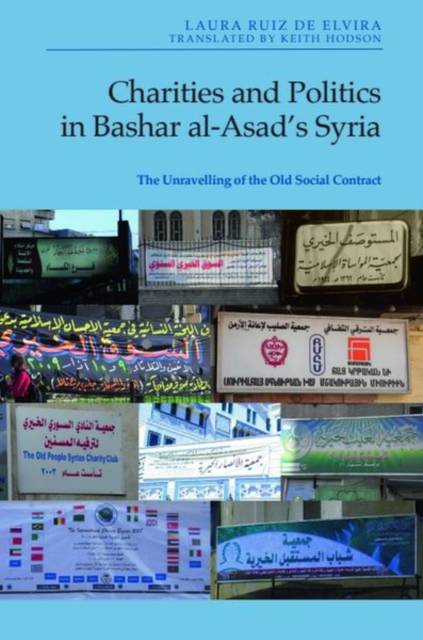
- Afhalen na 1 uur in een winkel met voorraad
- Gratis thuislevering in België vanaf € 30
- Ruim aanbod met 7 miljoen producten
- Afhalen na 1 uur in een winkel met voorraad
- Gratis thuislevering in België vanaf € 30
- Ruim aanbod met 7 miljoen producten
Zoeken
Charities and Politics in Bashar Al-Asad's Syria
The Unravelling of the Old Social Contract
Laura Ruiz de Elvira
Hardcover | Engels
€ 201,45
+ 402 punten
Uitvoering
Omschrijving
Charities and Politics in Bashar al-Asad's Syria analyses the renewal and revival of the role of Syrian charities during Bashar al-Asad's first ten years in power (2000-2010) in order to understand the political engineering deployed by the Syrian regime in the decade prior to the uprising. Based on extensive ethnographic fieldwork undertaken between 2007 and 2010, as well as on more than fifty interviews and other secondary sources, this book is the first comprehensive study of the country's poorly known sector of associations and charitable organisations at the beginning of the 21st century. It provides first‐hand accounts of crucial issues that did not receive scholarly attention before the uprising - such as the shift in state-society relations, the opening of the civic arena, the partial outsourcing of welfare provision and social responsibilities and, eventually, the unravelling of the old social contract, which the protest movement dramatically brought to the forefront in 2011. By carrying out a unique analysis of the management of civil society by state institutions and the First Lady's government-operated NGOs, it also provides keys to understanding both the resilience of Bashar al-Asad's authoritarian regime in the 2000s and the simultaneous weakening of its credibility amongst the population.
Specificaties
Betrokkenen
- Auteur(s):
- Vertaler(s):
- Uitgeverij:
Inhoud
- Aantal bladzijden:
- 312
- Taal:
- Engels
Eigenschappen
- Productcode (EAN):
- 9781399528207
- Verschijningsdatum:
- 31/12/2024
- Uitvoering:
- Hardcover
- Formaat:
- Genaaid
- Afmetingen:
- 156 mm x 234 mm
- Gewicht:
- 616 g

Alleen bij Standaard Boekhandel
+ 402 punten op je klantenkaart van Standaard Boekhandel
Beoordelingen
We publiceren alleen reviews die voldoen aan de voorwaarden voor reviews. Bekijk onze voorwaarden voor reviews.







